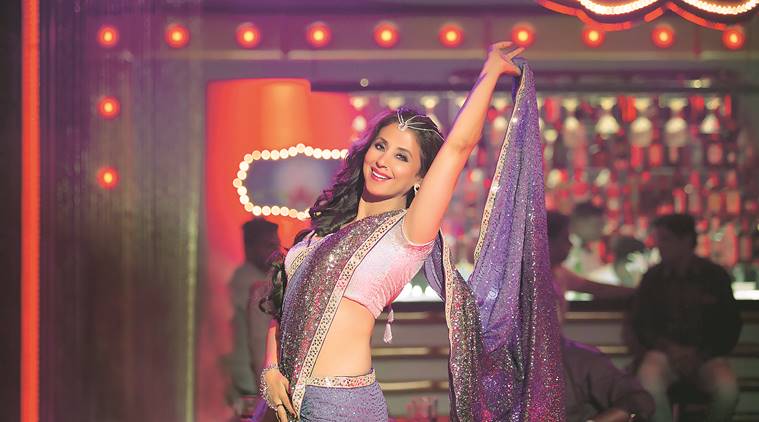 Urmila Matondkar in the song Bewafa beauty in Blackmail
Urmila Matondkar in the song Bewafa beauty in Blackmail
WHEN an old acquaintance compliments Urmila Matondkar for looking “just the same”, the actor, who features in a “naughty” number, Bewafa beauty in the upcoming release Blackmail, brushes it off saying, “It’s my job”. Though she is making a big screen appearance after a long gap, Matondkar is at ease during promotional shoots and other activities planned around her in a suburban Mumbai hotel.
Clad in a peach jumpsuit, she talks about the “rush of excitement” that she experienced when the faced the camera for the song, which is set in a dingy bar. Once that excitement settled down, the challenge of performing took over. “Since the lyrics are so powerful, I was careful about adding the right tadka to it with my performance even as I was careful about not overdoing it. The performance demanded more adayagi and nakhras,” she says. The song is written by Amitabh Bhattacharya and composed by Amit Trivedi.
When director Abhinay Deo approached her for the number, its naughty tone appealed to Matondkar. “When I listened to the song, I thought I had not heard a more naughty and sensuous song. Trust me, I’m a Hindi film buff and I listen to a lot of Hindi songs,” says the 44-year-old, who has danced to some of the grooviest numbers in Hindi movies including Tanha tanha (Rangeela), Chamma chamma (China Gate) and Aa hi jaiye (Lajja). The Blackmail song, however, demands her to be more expressive than to show her dance moves. “I’m like a diva in a dingy bar and trying to convey (to Irrfan’s character) that the lady in question has taken you for a ride and dumped you,” she adds.
The key to delivering a perfect dance number, according to Matondkar, is “internalising” the song. “On a number of occasions, the music could not be played during the shoot because of the constraints of a location or the situation we were in. In such situations, the song needs to be in your head. When you manage that, you can create the magic on screen,” she says. While shooting for Tanha tanha, she could not hear the music due to the sound of the sea. “That song was playing in my mind when we were shooting for it,” says the actor, who spent her time away from the sets travelling, scuba diving and practising yoga.
Matondkar is not a trained dancer. For someone, who was introduced as a dancing actor in Narasimha (1991), it has been “an exciting journey of learning on the job”. The actor says, “I’m like a clean slate. You can write anything on it as long as it is written well. I can perform western as well as Indian dance,” she says. Four years after Narasimha, it was Rangeela (1995) that consolidated her reputation as a dancer-actor. “In Rangeela, I performed different kinds of dance set to varied moods. It is like exploring the navarasa (nine emotions). The film starts with the introduction of this girl, who is innocent and bubbly, but goes on to capture her various emotions,” she recalls.
After Rangeela, Matondkar grabbed attention for being a sensuous actor. “Being sensuous is an integral part of being a woman, let alone an actor,” she says. The decade that followed Rangeela, according to her, was fun even though it demanded hard work. “I was picking up roles I had not done before as I get bored easily. After Rangeela and Bhoot, I declined many scripts which offered me similar roles. I also said no to item songs a lot of times,” says the actor, who tries to give her best to everything she does and “that includes getting up in the morning to play with my dogs”.
Though she entered the industry as a child actor in BR Chopra’s Karm (1977) and followed it up with Shekhar Kapur-directed Masoom (1983), she acted in some much-talked-about movies such as Satya (1998), Bhoot (2003), Pinjar (2003) and Ek Hasina
Thi (2004). When asked about Daisy Irani, who spoke up about being sexually harassed while working as a child actor, Matondkar said, “A victim can be stuck in the situation. It is brave of her to speak about it. While I was growing up, my parents had made it clear that studies were my priority. That kind of awareness is needed among parents and their children stepping into this world,” says Matondkar, who continued her college studies while working in movies, and graduated in psychology.